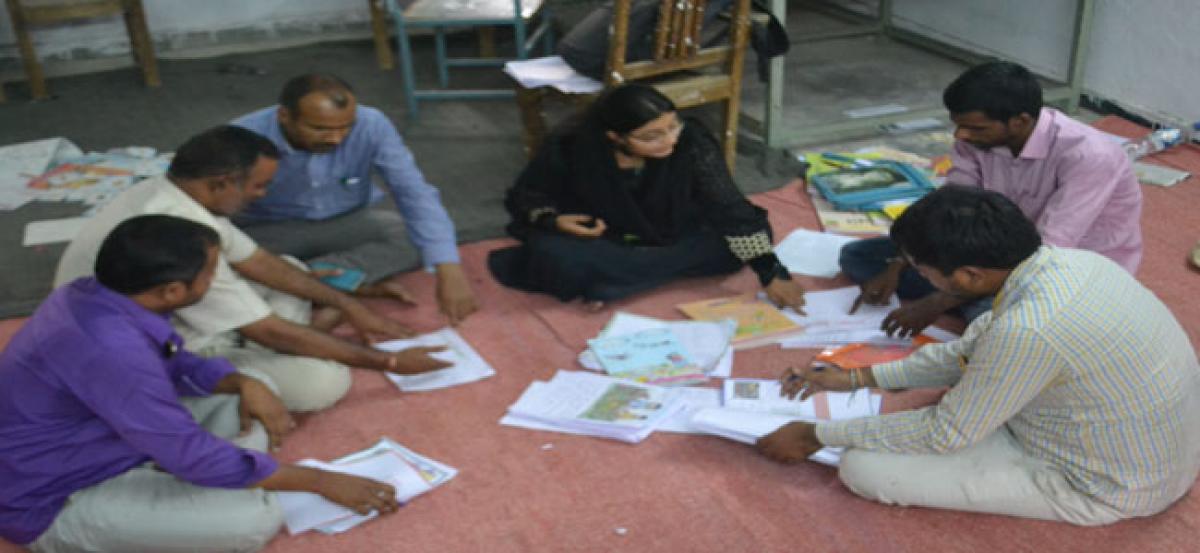Live
- G20 Leaders Will Talk About Climate, Taxes, and Trump's Return in Brazil
- COP29: CDRI announces $8 million funding for 12 projects to address climate crisis
- Anti-Telgu remarks: Actor Kasthuri Shankar moves court for bail
- Samsung AR Smart Glasses Set to Launch in 2025, Featuring Ray-Ban Meta-Like Design
- Kerala Industries Minister confident that new policy will boost plantation sector
- Madras HC plans inter-departmental monitoring committee to combat drug use in TN
- Bihar: Spotted deer dies due to heart attack in Banka district
- Mushtaq Ali T20: Shami to spearhead Bengal bowling attack, Gharami named captain
- Kharge's clarion call to oust Maharashtra's BJP-backed MahaYuti
- Why Ukraine’s Use of US Missiles Against Russia Could Lead to World War 3
Just In

Multi-grade and multi-level teaching method,” adopted by primary school teachers is making rapid strides in overhauling the education system in the district. The teachers have come up with this innovative method with the support and encouragement from District Collector Bharati Hollikeri.
Medak: “Multi-grade and multi-level teaching method,” adopted by primary school teachers is making rapid strides in overhauling the education system in the district. The teachers have come up with this innovative method with the support and encouragement from District Collector Bharati Hollikeri.
The district administration has given all support to the teachers in implementing the innovative techniques to make best use of existing infrastructure despite the shortage of teachers. It has been introduced in the schools which have less than 20 students with one or two teachers. It is aimed at boosting the learning ability of the children.
There are four subjects currently being taught for students in classes from third to fifth and three subjects to first and second classes. All these subjects and classes combined, currently teachers in these understaffed schools need to teach 18 subjects in total. It has become a burden on the teachers and has also been producing undesirable results despite Continuous Comprehensive Evaluation (CCE) method being followed to assess the progress of the student.
With the new system being put in place, each subject will be divided into around 20 modules (all classes combined). These 20 modules (also called milestones) will be divided into several activities based on the number of students in each class.
Students have to complete those activities and finish the module before getting to the next level (next module)- like completing the stages of a video game.
Teachers would be continuously monitoring the progress of the students because there are exercises after each activity and upon completion of a module.There will be peer group discussions and exercises among the students in a particular module which also helps build competitive team spirit among the children right from their primary school days. The need for bulky textbooks has been eliminated in these schools, as all subjects have been brought under one book which is to be printed and distributed soon in these 100 schools. However, care has been taken not to deviate from the syllabus.
“We have taken syllabus and content from the regular textbooks, added what we have extracted out of our training sessions, story books, other books, exercises and worksheets which would help the student think out-of-the-box through the innovative activities which are fun to do,” asserted Tirupathi Reddy, a teacher from UPS Kulcharam, who is among the 20 plus teachers who have been volunteering for drafting the syllabus since May 2.
“In the present system there is no way to stop a student from getting promoted up to tenth class even though he/she/other may not have the required proficiency in some subjects. In this new system, teachers will ensure that even a fifth class child if found weak in one of the subject modules of third class, that student will be required to complete that particular module and that too without any pressure on the student for lagging behind,” said Madhu Mohan, Academic Nodal Officer, who is supervising the effort.
“Due to family and financial emergencies children may have to migrate to other areas annually along with their parents to work in fields. Through this system, when they return, they can start completing the modules/milestones without
Innovative ideas need administrative support to bring about a change these days. Even this effort is one such example. If not for the interest shown by District Collector Bharati Hollikeri, such a painstaking effort would not have been completed within such a record time.
“Education is one of the most important aspects to understand human development in a particular district or area. It is one thing where the efforts of a Collector may not immediately bear fruits. But the inevitable change would be visible to a future administrator. We are grateful to Bharati Hollikeri for encouraging us in our efforts,” said Bharath Kumar Ganji, District Project Consultant for Columbia Global Centres (an affiliate of Columbia University).
By Vivek Bhoomi

© 2024 Hyderabad Media House Limited/The Hans India. All rights reserved. Powered by hocalwire.com







